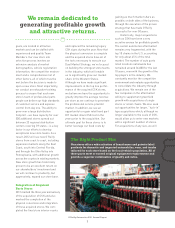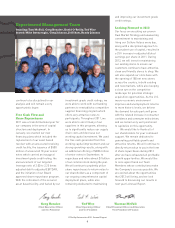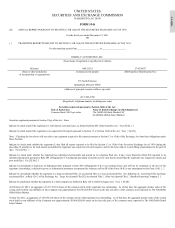O'Reilly Auto Parts 2011 Annual Report Download - page 19
Download and view the complete annual report
Please find page 19 of the 2011 O'Reilly Auto Parts annual report below. You can navigate through the pages in the report by either clicking on the pages listed below, or by using the keyword search tool below to find specific information within the annual report.
ive
10 es
9
Store Layout:
We utilize a computer-assisted store layout system to provide a uniform and consistent retail merchandise presentation and customize
our hard-parts inventory assortment to meet the specific needs of a particular market area. Front room merchandise is arranged to
provide easy customer access, maximum selling space and to prominently display high-turnover products and accessories to
customers. To ensure the best customer experience possible, we have selectively implemented bilingual in-store signage based on the
demographics in each store’s geographic area. Aisle displays and end caps are used to feature high-demand or seasonal merchandise,
new items and advertised specials.
Store Automation:
To enhance store-level operations, customer service and reliability, we use Linux servers and IBM I-Series computer systems in our
stores. These systems are linked with the I-Series computers located in each of our DCs. Our point-of-sale terminals provide
immediate access to our electronic catalog to graphically display parts and pricing information by make, model and year of vehicle
and use barcode scanning technology to price our merchandise. This system speeds transaction times, reduces the customer’s
checkout time, ensures accuracy and provides enhanced customer service. Moreover, our store automation systems capture detailed
sales information which assists in store management, strategic planning, inventory control and distribution efficiency.
New Store Site Selection:
In selecting sites for new stores, we seek to strategically locate store sites in clusters within geographic areas in order to achieve
economies of scale in management, advertising and distribution. Other key factors we consider in the site selection process are
identified below:
population density;
demographics including age, ethnicity, life style and per capita income;
market economic strength, retail draw and growth patterns;
number, age and percent of luxury makes of registered vehicles;
the number, type and sales potential of existing automotive repair facilities;
the number of auto parts stores and other competitors within a predetermined radius and the operational strength of such
competitors;
physical location, traffic count, size, economics and presentation of the site;
financial review of adjacent existing locations; and
the type and size of store that should be developed.
When entering new, more densely populated markets, we generally seek to initially open several stores within a short span of time in
order to maximize the effect of initial promotional programs and achieve economies of scale. After opening this initial cluster of new
stores, we seek to begin penetrating the less densely populated surrounding areas. This strategy enables us to achieve additional
distribution and advertising efficiencies in each market.
Management Structure
Each of our stores is staffed with a store manager and one or more assistant managers, in addition to parts specialists, retail and/or
installer service specialists and other positions required to meet the specific needs of each store. Each of our 355 district managers has
general supervisory responsibility for an average of 10 stores, which provides our stores with the appropriate amount of operational
support.
District managers complete a comprehensive training program to ensure each has a thorough understanding of customer service,
leadership, inventory management and store profitability, as well as all other sales and operational aspects of our business model.
Store managers are also required to complete a structured training program that is specific to their position, including attending a 40-
hour manager development program at the corporate headquarters in Springfield, Missouri. District managers and store managers also
receive continuous training through on-line assignments, field workshops and regional meetings.
We provide financial incentives to our district managers and all store Team Members through incentive compensation programs.
Under our incentive compensation programs, base salary is augmented by incentive compensation based upon their individual and/or
store’s sales and profitability. In addition, each of our district and store managers participates in our stock option program. We
believe that our incentive compensation programs significantly increase the motivation and overall performance of our district and
store Team Members and enhance our ability to attract and retain qualified management and other personnel.
Professional Parts People
We believe our highly trained team of Professional Parts People is essential in providing superior customer service to both DIY and
professional service provider customers. Because a significant portion of our business is from professional service providers, our
Professional Parts People are required to be technically proficient in automotive products. In addition, we have found that the typical
•
•
•
•
•
•
•
•
•
FORM 10-K
























